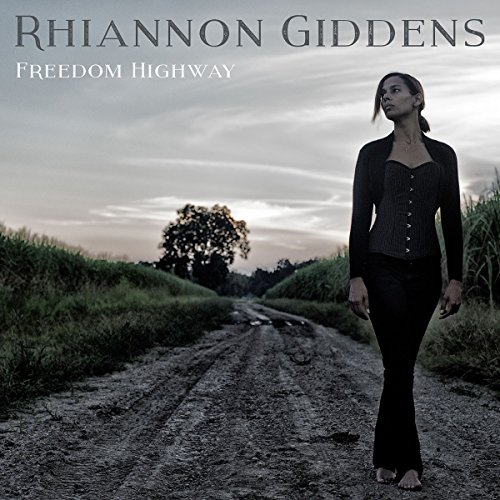
Rhiannon Giddens
Freedom Highway
Release Date: Feb 24, 2017
Genre(s): Folk, Pop/Rock
Record label: Nonesuch
Music Critic Score
How the Music Critic Score works
Buy Freedom Highway from Amazon
Album Review: Freedom Highway by Rhiannon Giddens
Exceptionally Good, Based on 8 Critics
Based on rating 9/10
Rhiannon Giddens has always been keenly aware of the arc of American history -- the Carolina Chocolate Drops, the 2000s band she once led, was designed as a critique of the darker moments of Americana -- but Freedom Highway, her second solo album, puts her intent into perspective. Where her 2015 solo debut, Tomorrow Is My Turn, was essentially a covers album, gaining its importance through context, Freedom Highway relies on originals, but the past is never far behind. This should be expected from Giddens, who is at her core a folk artist building upon -- and expanding -- tradition, but it's still startling to realize how she establishes a vernacular at the outset of Freedom Highway, then explores all of the possibilities of African-American folk music on the album.
Based on rating 9/10
Rhiannon Giddens has been turning heads with her talent -- and opening hearts and minds with her vibrant storytelling -- for several years. While many may point to her 2011 Grammy win or arresting performance at the 2013 concert "Another Day, Another Time" as formative moments in her career, the histories that inform Giddens' music run much deeper and further back than that. On Freedom Highway, Giddens juxtaposes historical narratives with present-day contexts for an emotionally powerful record. "At the Purchaser's Option" tells the story of a young woman wondering if she'll get to keep her baby when she's sold as a slave.
Based on rating 8.5/10
Always ambitious, Americana/traditional folk artist Rhiannon Giddens uses Freedom Highway, her second solo album, for a contemporary end: tracing the roots of the #BlackLivesMatter movement from plantation property to today. Joined by two protest songs (Richard Farina's "Birmingham Sunday" and Pops Staples' title track) and one old blues cut (Mississippi John Hurt's 1928 murder ballad "The Angels Laid Him Away"), the Carolina Chocolate Drop weaves a song cycle from slavery's pain and abuse, the jolt and reality that drove the Civil Rights movement and our current epidemic of young black men shot by police. Opening with "At the Purchaser's Option," she establishes a first person narrative to explore the crimes against human decency white owners extracted from black women.
Based on rating 4
Giddens fades in her cover of The Staple Singers’ Freedom Highway, a clever acknowledgement that this music of resistance has been playing for decades. But her storytelling sweeps back much further than the Civil Rights Movement. At The Purchaser's Option balances on a clause that allowed masters to buy or refuse their slaves' newborn babies. Julie and Come Love Come are originals set during the American Civil War.
Based on rating 4/5
Look no further than the name of Rhiannon Giddens' sophomore release to get a sense of its contents. The title track, a popular — even historic — Staples Singers classic, captures the theme of the Civil Rights Movement in America with the same sense of pride and determination that Giddens displays on every selection of her sophomore solo release. It's often not an easy listen.
Based on rating 4
Giddens fades in her cover of The Staple Singers’ Freedom Highway, a clever acknowledgement that this music of resistance has been playing for decades. But her storytelling sweeps back much further than the Civil Rights Movement. At The Purchaser's Option balances on a clause that allowed masters to buy or refuse their slaves' newborn babies. Julie and Come Love Come are originals set during the American Civil War.
Based on rating 4.0/5
“Know thy history,” writes Rhiannon Giddens in the press notes for her sophomore effort, Freedom Highway. “Let it horrify you; let it inspire you.” The album—named for a civil rights anthem penned by Pop Staples—is awash with history, with stories carried down through bloodlines, at once ancient as the earth and as contemporary as today's torments. For those who see their own stories in Freedom Highway's laments, it will seem as if Giddens is content to gloomily reflect back to us our own experiences, but for those willing to see these songs as calls to action, the album is nothing short of inspiring.
Based on rating 4/5
U nlike Rhiannon Giddens' 2015 solo debut, an album of covers, most of Freedom Highway is original material, though steeped in the revivalist style of the group she co-founded, the Carolina Chocolate Drops. Banjo and fiddle are foregrounded in a production that breathes weathered timber and dusty roads. Some songs are clearly historical - At the Purchaser's Option and Julie are voices from slavery days - but Better Get It Right the First Time, complete with rap, could be from the urban present and Hey Bébé boasts muted New Orleans trumpet.
'Freedom Highway'
is available now

